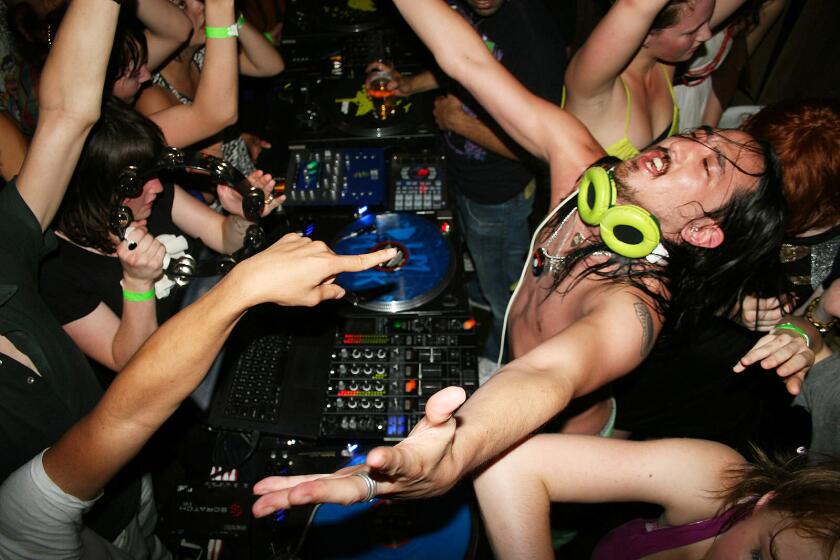For Dawn Upshaw, ‘Winds of Destiny’ lead to Ojai
- Share via
Reporting from Bronxville, N.Y. — — It’s unlikely that the lunch crowd in the Haiku Asian Bistro is aware that one of the world’s most progressive classical music singers is giving an interview in their chattering midst. But that’s how it is with Dawn Upshaw. She blends right in with the suburban moms in this boutique New York suburb, a brief drive from the town where Upshaw lives with her 17-year-old son. Her 21-year-old daughter is away in college.
However, it’s safe to say that Upshaw, 50, is the only one in the restaurant talking about her love for the contrapuntal music of 81-year-old composer George Crumb. She is definitely the only one who at the moment is singing “When Johnny Comes Marching Home,” which Crumb orchestrated in a recent work, “The Winds of Destiny,” to sound nothing like a wistful lament for a Civil War soldier to return home.
Upshaw demonstrates. “When Johnny comes MARCHING, when Johnny comes MARCHING, when Johnny comes marching HOME!” she sings.
“The way George Crumb sets the song is very pained and angry,” she says. “It’s just fierce. I don’t think it’s joyous. I don’t think it’s pride. I don’t think it’s bravery. I think it’s a struggle to understand, to deal with the loss and total destruction of human beings and countries.”
And does she feel the song is about now? “Well, sure,” she says.
Beginning Thursday, the hills of Ojai will be alive with the sounds of Upshaw. She will perform “The Winds of Destiny” at the Ojai Music Festival, the annual four-day festival of challenging classical music and, this year, thanks to Upshaw, who serves as music director and chose the performing artists, a jolt of jazz.
Thomas Morris, artistic director of the festival, who each year selects a new music director, says that the 2011 edition is all about the “many amazing facets of Dawn.” Morris has known Upshaw (who has sung at the festival in three previous years) since the 1990s, when he was executive director of the Cleveland Orchestra, with which Upshaw recorded Mahler’s Fourth Symphony. While assembling the festival with Upshaw, Morris says, “I discovered she is a deeper and more wide-ranging thinker than I had even known.”
Anybody who has heard Upshaw sing — and millions have, thanks to her recording of Henryk Gorecki’s “Symphony of Sorrowful Songs” — has experienced the depths of her talent. A natural soprano, her voice is like a ray of light in a forest. Its luminous tone is proof that some things in the world can never be manufactured. Argentine composer Osvaldo Golijov, who has written works for Upshaw that have pushed her into some of her highest and brightest, lowest and darkest registers, has said that what distinguishes her soprano is a “stillness in her sound.”
Over the years, her artistic life has been one of upending expectations.
In 2003, at the peak of her career as an opera singer, she said goodbye to Mozart and hello to contemporary composers such as John Adams, Kaija Saariaho and Esa-Pekka Salonen. “I feel more alive when I’m working with composers on new pieces than when I’m doing anything out of the canon,” she says. “The interaction with my colleagues became much more fun and exciting than whether I was going to sing again at the Vienna Staatsoper.”
While Upshaw has left formal opera in her wake, she continues to display her expressive acting and singing in staged productions such as Adams’ “El Niño.” She keeps a laser focus on new music to sing and this year hit the target with “That the Night Come,” a gloaming work by Irish composer Donnacha Dennehy, based on poems by Yeats, recorded on the just-released “Grá Agus Bás.”
The fact that Upshaw appears to have grown up in a Norman Rockwell painting has long endeared her to classical music fans. But her genial suburban image (she grew up in Park Forest, Ill.) can obscure the existential fissures in her life and art and belies her restless intelligence.
Those qualities peek through her explanations of why she chose the artists she did for Ojai, notably director Peter Sellars, with whom she has collaborated on staged performances for nearly 15 years, including on a searing oratorio written for her by Saariaho about the agonizing hunger strike of French philosopher and activist Simone Weil. The 2008 performance of the piece was charged with pathos for Upshaw fans, who knew she had to cancel the 2006 premiere of the work to undergo (successful) treatments for early-stage breast cancer.
In Ojai, Sellars is staging “The Winds of Destiny” to evoke the U.S. war in Afghanistan. As Upshaw puts it, “I’m essentially portraying a woman who’s come home from Afghanistan and is trying to sleep; and all of these demons, memories, sufferings, I can’t get them out of my head. But I’m still a woman who knows some joy, who’s trying to grapple with how the pain and the experience of war has affected her.”
Working with Sellars, Upshaw says, has constituted the most arduous and rewarding journey of her musical life. “Peter has this uncanny ability to know what my personal struggles are in any given moment,” she says. “He gives directives that are a direct hit on some huge dilemma in my life at the moment.”
Could she offer some examples? “That I can speak about?” she asks with an unsteady laugh. After a long pause, she offers, “It’s really too personal, the examples that are coming to my mind. But it does happen. Peter wants to get to this truth that is scary. He creates a safe place to really dig deep, and then he goes there. He sees the scars. It’s not that he’s taking advantage of me. He helps connect me to truth in a moment.”
For his part, Sellars downplays his influence. “Dawn’s depth of musicality is always astonishing,” he says during a phone interview. “You feel everything that she’s feeling comes right from her. When she’s in Messiaen or Handel or Osvaldo Golijov, you’re having an experience of such immediacy and depth of conviction that you think a human being is just opening themselves up with the most daring level of honesty.”
“The Winds of Destiny” is a chapter in Crumb’s “American Songbook,” a Melvillian novel of music written for voice, percussion and prepared piano that entwines Native American songs, African slave spirituals and Civil War folk songs, including “Shenandoah” and “Battle Hymn of the Republic.” In the stark piece, Sellars offers, “You sense that the Civil War is still going on. You sense the violence and virulence of our public atmosphere today, of the country tearing itself apart.”
While “The Winds of Destiny” may expose the civil war inside Upshaw, her listeners and America itself, the soprano will show off her pastoral side in her other major commission, “Winter Morning Walks,” an orchestral work by New York jazz composer Maria Schneider. Upshaw says she has been “nuts about Maria” ever since she heard Schneider’s 2004 album, “Concert in the Garden,” a jubilant ballet of Brazilian jazz that won a Grammy Award.
Schneider, who grew up in rural Minnesota, found inspiration for “Winter Morning Walks,” a set of songs, in a book of poems by Nebraska poet Ted Kooser. The former U.S. poet laureate wrote the poems, pungent with small-town imagery, when he was being treated for cancer and took predawn walks, on doctor’s orders, to stay out of the sun.
“The poems have a simple beauty — so clear and pure,” Schneider says during an interview in her New York apartment. “To me, Dawn has that same kind of accessibility, clarity, that deep quality of Midwestern heart.”
For the Ojai festival, Upshaw says, she is delighted to have the light in Schneider’s music (Schneider’s jazz orchestra also performs) to balance the dark in Crumb’s. “I hear so much nature in Maria’s music. So much beauty, so much heart, so much joy, but also so many colors and levels in the orchestration.” Many hues in between will be heard in the festival, in Purcell’s Baroque songs and Bartok’s Hungarian folk tunes, Beethoven’s “Kreutzer” sonata and Schoenberg’s “Transfigured Night.”
Excitedly anticipating her performances in Ojai, and looking back at a year of planning them, Upshaw says the festival represents a wonderful culmination of her career. At the same time, a note of stress creeps into her voice.
“I don’t ever see my work as finished,” she says. “I am always interested in the process and how far I can get to that 100% of truth and focus and concentration.” It’s true, she admits, that now, as she’s grown older, “I think I’m nicer to myself. But I don’t feel self-satisfaction or settled. I certainly don’t feel, ‘Ah, I can relax now.’”
More to Read
The biggest entertainment stories
Get our big stories about Hollywood, film, television, music, arts, culture and more right in your inbox as soon as they publish.
You may occasionally receive promotional content from the Los Angeles Times.









